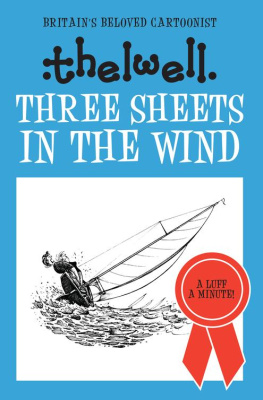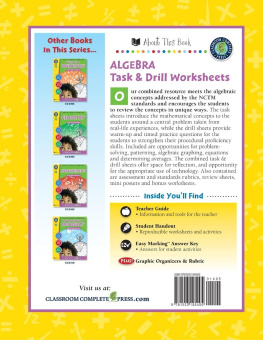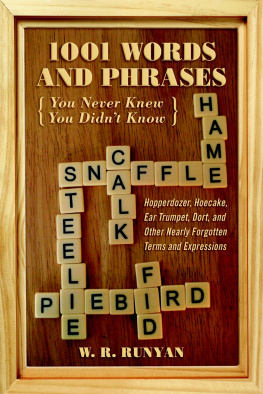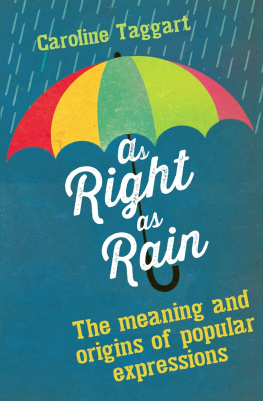THREE SHEETS to the WIND
THREE SHEETS to the WIND
The Nautical Origins of Everyday Expressions
Cynthia Barrett
Illustrations by Vail Barrett
Guilford, Connecticut
An imprint of The Rowman & Littlefield Publishing Group, Inc.
4501 Forbes Blvd., Ste. 200
Lanham, MD 20706
www.rowman.com
Distributed by NATIONAL BOOK NETWORK
Copyright 2018 by Cynthia Barrett
All rights reserved. No part of this book may be reproduced in any form or by any electronic or mechanical means, including information storage and retrieval systems, without written permission from the publisher, except by a reviewer who may quote passages in a review.
British Library Cataloguing in Publication Information available
Library of Congress Cataloging-in-Publication Data available
ISBN 978-1-4930-4227-2 (paperback)
ISBN 978-1-4930-4228-9 (e-book)
 The paper used in this publication meets the minimum requirements of American National Standard for Information SciencesPermanence of Paper for Printed Library Materials, ANSI/NISO Z39.48-1992.
The paper used in this publication meets the minimum requirements of American National Standard for Information SciencesPermanence of Paper for Printed Library Materials, ANSI/NISO Z39.48-1992.
Printed in the United States of America
For my great-grandfather, George Washington Barrett, a whaler, who sailed around Cape Horn three times. For my father, a Navy Lieutenant who served in the D-Day Invasion of France. For my mother, who stood on the shore watching over us. And for Susi, a north star in a big sky.
Contents
Introduction
T he English language is chock-full of nautical expressions. The earth is, after all, the water planet. Words and phrases coined by seamen trip off the tongue. A look at old maps shows the cross-hatching of age-old naval and trade routes. Textiles, spices, indigo, and other sought after goods emerged from cargo holds. What also came ashore was the language of sailors.
This inherited idiomatic nautical language is spoken so often in conversation that it goes unnoticed. Filibusters are an invention of pirates, not the US Senate, and the first skyscrapers were the tallest sails on a ship.
Three Sheets to the Wind is an illustrated guide to your language, so that the next time you call your friend a loose cannon you know it is you who is talking like a sailor.
THREE SHEETS to the WIND
A1
An insurance rating, not a steak sauce. Lloyds of London got its start rating ships according to the quality of construction. A1 was first class.
Above Board
Pirate ships convinced passing seafarers they were no threat by concealing most of the crew below deck. In contrast, merchant ships, with nothing to hide, carried equipment and crew on deck and in plain sight. That openness is reflected in todays meaningtransparent, straightforward dealing.
Its all open and aboveboard, apparently. After the war, Boneys Old Guard formed an organization for mutual aid. In 1816 they decided to become colonists. Your lordship must have heard something about the project?
C. S. FORESTER
Admiral Hornblower in the West Indies
Adrift
A ship detached from its mooring and floating randomly with the wind, tides, or currents. A person who is dissatisfied and aimless is adrift.
Albatross
With wingspans of up to eleven feet and the ability to glide for hundreds of miles, the albatross fueled the imaginations of seafarers who believed these huge birds contained the souls of dead sailors. Killing an albatross was bad luck. Today having an albatross around ones neck is to carry a heavy, unshakeable burden.
...what evil looks
Had I from old and young!
Instead of the cross, the Albatross
About my neck was hung.
SAMUEL TAYLOR COLERIDGE
The Rime of the Ancient Mariner
All Hands on Deck
During a storm or other crises, the boatswains cry of all hands on deck signaled the entire crew to handle the sail. These days it is an entreaty or order for everyone to pitch in and help with a problem or reach a goal.
It was all hands on deck then, with a rush...to get the eighteen heavy yards around with the wind howling against them the wrong way.... It was a wild scene, that, with the tropic rain falling solidly on the boys faces as they ran about the deck, bawling their sailors shouts....
ALAN VILLIERS, aboard the tall ship Duchess
Aloof
From the Dutch word loef meaning to sail into the wind. In order to safely clear the shore when a wind was blowing the ship towards this danger, the vessel pointed into the wind and away from the hazard. This nautical technique for maintaining distance inspired its figurative meaning of being emotionally distant or indifferent.
With all our force we kept aloof to sea, and gaind the island where our vessel lay.
HOMER
The Odyssey
Around the Horn
Before the Panama Canal, ships had to navigate around Cape Horn, the southernmost part of South America, to sail between the Atlantic and Pacific Oceans. Around the horn now commonly describes the baseball ritual of infielders throwing the ball around the bases after a strike out and with no runners on.














 The paper used in this publication meets the minimum requirements of American National Standard for Information SciencesPermanence of Paper for Printed Library Materials, ANSI/NISO Z39.48-1992.
The paper used in this publication meets the minimum requirements of American National Standard for Information SciencesPermanence of Paper for Printed Library Materials, ANSI/NISO Z39.48-1992.










